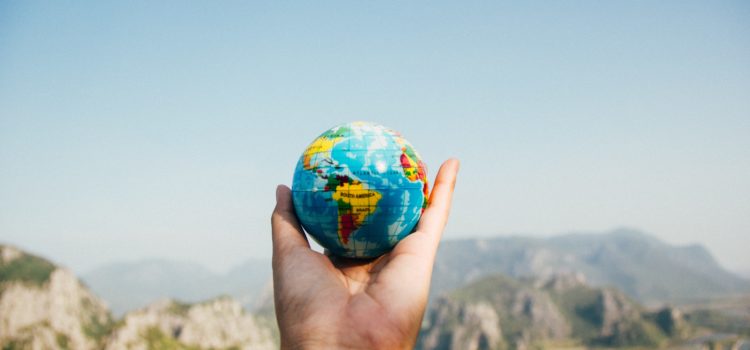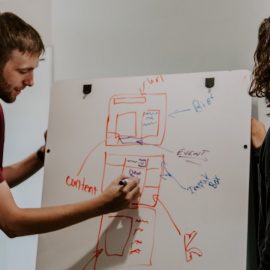

This article is an excerpt from the Shortform book guide to "Thank You for Being Late" by Thomas L. Friedman. Shortform has the world's best summaries and analyses of books you should be reading.
Like this article? Sign up for a free trial here .
What exactly is globalization? What role does technology play in the increasing pace of globalization?
Accelerations in technology have resulted in a corresponding acceleration in globalization—the flows of knowledge and information that connect the world and make every part dependent on all the other parts. According to Thomas Friedman, the author of Thank You for Being Late, there are three kinds of globalization happening in the world: 1) the flow of technological knowledge, 2) the flow of business, and 3) the flow of money.
Keep reading to learn about the three types of globalization and their implications for the world at large.
The Tides of Globalization
Advances in technology made globalization possible. In the 20th century, pre-internet, the economy was based in the exchange of physical goods, services, and money. In 1990, when the internet was just emerging and 435 million tourists traveled around the globe, the global flows of finance, services, and goods were 24% of the world’s GDP.
Today, physical flows have slowed or declined, but the transmission of data across the globe has shot up. In 2014, 1.1 billion tourists traveled around the globe, and the global flows of finance, services, and goods were 39% of the world’s GDP. Digital goods, such as ebooks or movie rentals, are much easier to distribute globally than physical goods, and eventually, 3-D printing might digitize even more products.
Additionally, since 2005, cross-border internet traffic is 45 times larger. Almost a billion people have at least one international contact on social media, and on Facebook, 50% of people have at least one international friend.
MGI Connectedness Index
The MGI Connectedness Index is a measure of how much different countries are participating in global flows of knowledge and information. Participation in global flows is a good indicator of growth and prosperity because connected countries have access to the most data and are the first to see new ideas. For example, Singapore is at the top of the index because it has both the infrastructure to connect with different flows and citizens educated enough to make use of the flows.
There’s a correlation between GDP and “high internet penetration.” As technology grows and the population of a country adapts to this new technology, the workforce becomes more productive, and GDP increases.
Kinds of Globalization
Globalization is the flow of knowledge and information, and there are several different kinds of globalization, each named for what type of knowledge or information is flowing around the world.
The Flow of Technical Knowledge
The first type of globalization is the flow of technical knowledge. The supernova makes it possible to share technological advances all over the world.
Outsourcing
Outsourcing was an early stage of globalization. US and European companies took advantage of the fact that the world was more connected and hired relatively cheap international engineers to solve their problems. For example, many Indian engineers worked on solving Y2K—the worry that computers would stop working at the beginning of the year 2000.
Once people in non-US or European countries were connected to the flows, they could start using them to solve their own countries’ problems. For example, Aloke Bajpai initially worked in the US before returning to India to start Ixigo.com. Ixigo is a travel search program that helps Indians find cheap travel options. Bajpai used open-source software and the supernova to build Ixigo, and it will run on the least advanced cell phones, allowing more people to access it.
Messaging Apps and Conversational Commerce
Conversational commerce is the phenomenon of messaging apps being fitted with additional non-messaging features such as allowing you to make reservations, buy things, or do your banking. For example, Venmo is an app that allows you to both transfer money to your friends and send them messages. These apps, which were created by technical flows, enable people to more easily participate in the other flows we’ll discuss below.
Messaging apps are becoming more popular than email. In the coming years, email will probably continue to exist but be used only for things that don’t require immediate attention. In addition to providing features for conversational commerce, messaging apps have far more features than email—they’re not restricted to text and can include media, stickers, GIFs, and location information. Messaging apps are also more convenient ways of connecting with people than phone or email—all you’ll need to connect with someone is their name.
The Flow of Business
The second type of globalization is the flow of businesses. These days, it’s cheap and easy to start a global business—all you have to do is set up your small business with a Facebook page or sell products via Amazon. In 2014, there were around 25 million small businesses on Facebook and just two years later, there were 50 million.
Since the flows of business result in the creation of more organizations, there’s more competition, and often from unexpected arenas. Usually, competitors are companies in a similar industry. However, many companies are branching out—for example, Amazon started as a bookstore and now makes Golden Globe-winning TV series.
The Flow of Money
The third type of globalization is the flow of money—globalization has resulted in the interdependence of markets. For example, when China experienced stock market turbulence in summer 2015, the American stock market was severely impacted within a week.
Example #1: Algorithms in the Stock Market
Notably, the use of algorithms in the stock market can have a huge effect on global financial flows. Companies can trade faster, which is more lucrative, if they use algorithms. For example, some firms can complete more than 100,000 trades per second.
However, these algorithms can fail or be tricked. For example, in 2015, Navinder Singh Sarao spoofed the market by creating a huge number of fake buy or sell orders. High-frequency trading firms program their algorithms to get out of the market when it gets too volatile, and Sarao made the market appear so volatile that all the algorithms pulled out at once, creating a crash. This allowed him to buy low, sell high, and make $875,000. He was later arrested.
Even when people aren’t spoofing the market, algorithms can go wrong—in 2012, Knight Capital lost $440 million in 45 minutes.
Example #2: Paypal
To be profitable, bank branches require $30 million worth of deposits. In low-income areas, branches don’t get enough deposits to justify their existence, so they close, which results in people who live in these areas having less access to banking services.
Enter Paypal, which digitizes money and allows it to be sent or received anywhere in the world. Instead of traveling long distances to banks, standing for hours in line, and being charged huge fees, people can send money on their phones.
Additionally, Paypal offers loans through its Working Capital program. It can take as little as minutes for a small business to get a loan through Paypal, versus the weeks it might take to get approved by a bank. Paypal doesn’t rely on credit scores; they look at your payment records through Paypal, and their analysis is actually a more accurate picture of your creditworthiness than a credit score.
The Flow of Human Connections
In addition to creating technical, business, and financial flows across the world, globalization has also contributed to the final type of flow—the flow of human contact. Pre-acceleration, your community was the people who were physically close to you. If you left a community, you lost the old one and found a new one wherever you went. Now, you can keep in touch with anyone anywhere in the world and there are more ways than ever to connect with strangers—social media, gaming, international TV, and so on.
Public Opinion
Flows allow for a global conversation about values and public opinion is changing faster than ever. People meet and talk to people they never would have encountered in real life, and encountering more people creates empathy. For example, homophobic people have more opportunities to meet gay people and possibly develop more positive attitudes.
Unfortunately, this works the other way too—people with negative ideas can more easily find each other and connect. For example, neo-Nazis use social media to find new converts.

———End of Preview———
Like what you just read? Read the rest of the world's best book summary and analysis of Thomas L. Friedman's "Thank You for Being Late" at Shortform .
Here's what you'll find in our full Thank You for Being Late summary :
- The problems that arise when the world changes faster than humanity can adapt
- How to adapt to technology, globalization, and climate change
- The importance of taking time to reflect and reorient






